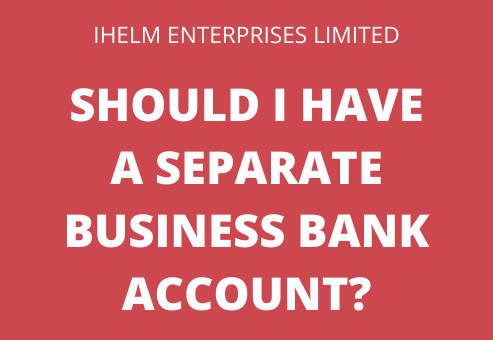During the February 2022 Facebook Live, I talked about why you should have a separate business bank account for your business.
When someone first sets up their business, they may start to use their own personal bank account for the business, and not even consider getting a separate bank account for the business. It might be easy enough to keep track of the business transactions at the start, but once your business grows, it can become quite difficult.
While there is no actual rule that says a self-employed business must have a separate bank account, it is good practice to do so as that way you can ensure you know exactly what funds the business has and it makes it easier to prepare your accounts. If your business is a limited company, you are legally required to open a business bank account as the business is a separate legal entity.
Why should I have a separate bank account for my business?
- It makes it easier to see exactly how much money the business has.
One of the main reasons to have a separate bank account for the business, is so that you can see straight away which transactions relate to the business. You can check the balance on the account and know straight away how much money the business has – you won’t need to try and figure out which transactions are relating to the business or which transactions are personal. - It reduces the admin time required for getting the accounts completed.
It makes it much easier for your bookkeeper or accountant to ensure the accounts are fully correct, as they won’t need to try and figure out which transactions are personal, and which are business related. By having a separate bank account for the business, you will be saving a lot of time in terms of admin, and a lot of stress in trying to remember whether a transaction was a personal one or not. - It makes it possible to reconcile the account.
Another reason is that at the end of the month, you will be able to properly reconcile the account, and easily track customer payments you’ve received so you can make sure your debtors list is up to date. This means that your accounts will accurately reflect how much money the business has. - It helps to build up the business’ credit rating.
Having a separate bank account for the business, can help your business to build up its own credit rating – it can be very useful if you need to apply for a loan in the future. - It helps to build trust with your customers and suppliers.
Having a separate bank account for the business can give your business a more professional appearance as the business name would appear on your cheques and debit card, this in turn can help customers and suppliers to have more trust in your business. - You can connect the bank account to your accounts software.
A lot of the accounts software now allows bank accounts to be connected to a bank feed, meaning that the transactions can be automatically downloaded into the accounts software, ready for categorising. This can make getting your accounts completed more efficient, as you, or your bookkeeper/accountant, won’t have to manually enter every single transaction. - It makes HMRC inspections go a lot easier.
If you are using a bank account for both the business and your personal items, if HMRC ever do an inspection on your business, they will go through every transaction on the bank statements and could ask to see proof that each transaction is for the business or for personal use. It can make things very complicated and more time consuming.
All the reasons I’ve stated about why it’s a good idea to have a separate bank account, also apply to having a separate PayPal Account or credit card for the business.
What else do I need to know?
It is important that when you are looking at bank accounts for the business if you are a sole trader, you check the terms and conditions if you are going to use a personal bank account as opposed to a business bank account, as not all personal accounts are allowed to be used for businesses.
Before you choose a bank account for your business, have a think about what types of payments you will need to receive and make – will you need to accept/send foreign amounts? If so, will you be charged for doing that? Do you need to be able to access a branch on a regular basis, or are you able to deal with all your banking needs online or through the post? There are so many different types of bank accounts out there, so it is very important that you research the different options that are available and choose the right one for your business.
If you would like further information on why having a separate bank account for your business is a good idea, feel free to e-mail me.

